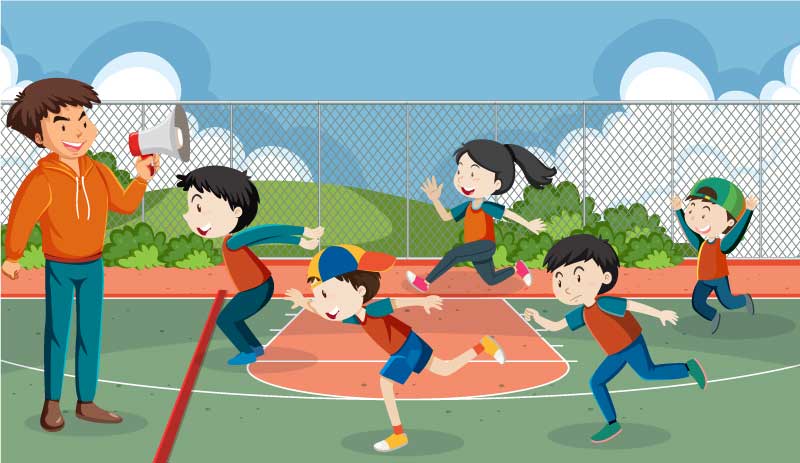Researchers have highlighted that approximately 45 million youths aged six to 18 participate in organized sports (Bean et al., 2014). While sports are commonly lauded for their positive effects on children and adolescents, it’s crucial for parents and coaches to acknowledge the potential impact of competitive sports on mental health. Supporting young athletes in fostering healthy relationships with sports entails recognizing the risks they may encounter. This involves understanding the pressures, stresses, and challenges inherent in competitive environments and taking proactive steps to mitigate negative outcomes. By prioritizing holistic well-being alongside athletic achievement, adults can help young athletes navigate the complex terrain of sports participation, fostering resilience and promoting mental wellness.
The benefits of sports to the youth’s mental health
Participation in sports among children and adolescents yields far-reaching benefits beyond physical health, positively influencing their mental well-being. Engaging in sports activities not only fosters physical fitness but also facilitates social interaction and cultivates vital life skills like resilience, collaboration, and problem-solving. Research indicates that boys who participate in sports during their formative years exhibit a decreased risk of encountering emotional stress, including depression and anxiety, in later stages of life (Kuntz, 2022).
Furthermore, joining a sports team has been associated with enhanced mental health outcomes in youth. Studies have shown that such participation serves as a protective factor against mental health issues such as depression, anxiety, withdrawal, and social problems. Additionally, involvement in sports teams has been linked to improvements in attention span, cognitive function, and the management of conditions like ADHD (Dekin, 2023). These findings underscore the multifaceted benefits of sports participation in promoting holistic well-being among children and adolescents.
The significant impact of competitive sports on youth
While youth sports participation undoubtedly offers mental health benefits, it’s essential to acknowledge the potential drawbacks, particularly within individual sports. Research indicates that engagement in individual sports is linked to heightened risks, including increased anxiety by 16 percent, withdrawal by 14 percent, social problems by 12 percent, and attention problems by 14 percent. Notably, individuals involved in individual sports face a greater risk of depression compared to those in team sports. Gender disparities also emerge, with girls exhibiting a higher susceptibility to mental health challenges than boys.
Various factors contribute to mental distress among young athletes, including the intense pressure within competitive environments, burnout, experiences of abuse, perfectionism, and injury. Abuse from coaches and parents, often driven by a win-at-all-costs mentality, may manifest through coercive tactics or punitive measures for underperformance. Injury stands out as a significant trigger for mental distress among youth athletes. The rigorous demands and high-stress nature of sports can lead athletes to overtrain, increasing the likelihood of injuries and causing trauma for children and adolescents. Furthermore, the use of performance-enhancing drugs among youth athletes, including unverified supplements and extreme dieting aids, exacerbates mental health risks and underscores the need for vigilant oversight (Kuntz, 2022; Dekin, 2023).
Providing support for young athletes
Given the potential risks associated with youth sports participation, it is imperative for parents and coaches to offer unwavering support to young athletes. Establishing an environment where athletes feel comfortable discussing their struggles is paramount. Parents and coaches should adopt an open-door policy, actively encouraging athletes to communicate any difficulties they may be facing. Regular check-ins can be beneficial, particularly for athletes who may be hesitant to seek help. Equipping athletes with healthy coping mechanisms and dispelling unrealistic beliefs, such as equating self-worth solely with performance outcomes, is essential. Encouraging athletes to explore interests beyond sports helps prevent the development of an identity solely centered around athletic achievement. Furthermore, adults must be mindful of their language, opting for supportive and constructive phrases that avoid placing undue pressure on athletes (Dekin, 2023).
Moreover, it is crucial for licensed mental health providers to establish robust networks comprising professionals specializing in both mental health and athletic performance. This proactive approach ensures timely referrals for young athletes exhibiting risk factors. Mental health professionals with expertise in sports and performance psychology, commonly known as sports psychologists, are well-suited to address performance-related or mental health concerns. Additionally, mental strength coaches or mental performance consultants with diverse educational backgrounds are equipped to diagnose and manage issues linked to sports performance. They play a vital role in identifying mental health challenges and facilitating appropriate referrals to mental health providers when necessary (Kinsella and Swanlund, 2022).
Conclusion
In summary, while sports offer a myriad of physical and mental health advantages, it’s essential to acknowledge the potential downsides. Team sports have demonstrated favorable effects, mitigating anxiety, depression, and social challenges among young individuals. Participation in sports can also be beneficial for children diagnosed with ADHD. Conversely, involvement in individual sports heightens the risk of mental distress due to various factors, including intense competition, burnout, maltreatment, perfectionism, injuries, and substance abuse.
To mitigate these risks, parents and coaches should prioritize open communication with young athletes, providing them with appropriate education to cope with potential challenges. Encouraging athletes to cultivate identities beyond their sporting endeavors can also foster resilience and promote balanced well-being. Additionally, establishing a robust network of mental health providers, encompassing professionals such as sports psychologists and mental performance consultants, is crucial. This ensures proactive measures are in place to address both mental health issues and performance-related concerns in young athletes, ultimately promoting their holistic development and well-being.
References
Bean, C., Fortier, M., Post, C. and Chima, K., 2014. Understanding How Organized Youth Sport May Be Harming Individual Players within the Family Unit: A Literature Review. Available at: https://www.ncbi.nlm.nih.gov/pmc/articles/PMC4210977/#:~:text=Within%2520the%2520United%2520States%252C%2520close,surrounding%2520the%2520youth%2520sport%2520environment [Accessed 17 January 2024].
Dekin, S., 2023. The Good And Bad Of Youth Athletics On Your Child’s Mental Health. Available at: https://sbtreatment.com/blog/the-good-and-bad-of-youth-athletics-on-your-childs-mental-health/#:~:text=For%20instance%2C%20children%20and%20teens,17%25%20reduction%20in%20social%20problems [Accessed 17 January 2024].
Kinsella, S.B. and Swanlund, C., 2022. How We Can Support the Mental Health of Young Athletes. Available at: https://www.aap.org/en/news-room/aap-voices/how-we-can-support-the-mental-health-of-young-athletes/ [Accessed 17 January 2024].
Kuntz, L., 2022. How Competitive Sports Affect Youth Mental Health. Available at: https://www.mindpath.com/resource/how-competitive-sports-affect-youth-mental-health/ [Accessed 17 January 2024].
